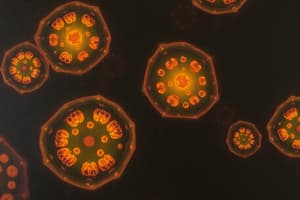Podcast
Questions and Answers
What is the role of genetics in human biology?
What is the role of genetics in human biology?
- Determining traits and predisposing individuals to various conditions (correct)
- Regulating the respiratory system
- Breaking down food in the gastrointestinal system
- Producing energy for cellular processes
Which statement accurately describes the interconnected systems in the human body?
Which statement accurately describes the interconnected systems in the human body?
- Each system performs specialized tasks that are unrelated to each other
- All systems work independently without coordination
- Each function contributes to the overall health and survival of the individual (correct)
- The systems do not contribute to the overall health of the individual
What is the foundation of human biology, leading to tissue and organ development?
What is the foundation of human biology, leading to tissue and organ development?
- Vitamin absorption
- Atomic and molecular structures (correct)
- Muscular movements
- Bone density
How does homeostasis contribute to human health?
How does homeostasis contribute to human health?
Which factor allows us to predict potential future outcomes for offspring?
Which factor allows us to predict potential future outcomes for offspring?
Why is understanding human biology not solely about memorization?
Why is understanding human biology not solely about memorization?
Flashcards are hidden until you start studying
Study Notes
Human Biology: Understanding Life's Complexities
Human biology delves deep into the intricate workings of the human organism, exploring everything from cellular processes to whole-body systems. To grasp the essence of human biology, one must first comprehend the building blocks of life: cells. Atomic and molecular structures form the foundation, leading to the development of tissues, organs, and eventually, a fully functional human being.
The human body consists of several interconnected systems, each performing specialized tasks. From digesting food in the gastrointestinal system to transporting oxygen through the respiratory system, each function contributes to the overall health and survival of the individual. Additionally, homeostasis maintains a stable internal environment despite external changes, ensuring proper functioning.
Genetics plays a significant role in human biology, determining traits and predisposing individuals to various conditions. Genetic inheritance allows us to trace ancestry and predict potential future outcomes for offspring. Environmental factors can either complement or counteract genetic influences, demonstrating the complexity of biological interactions.
Understanding human biology is not solely about memorizing facts; it is about applying knowledge and investigating the underlying mechanisms behind physiological processes. By studying human biology, we can better appreciate the human condition and address challenges related to disease, aging, and environmental impact.
Studying That Suits You
Use AI to generate personalized quizzes and flashcards to suit your learning preferences.




